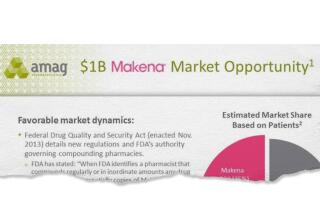Tokos Stock Dives After Critical Report : Health: Wall Street reacts to Canadian doctorsâ assessment of drug used to slow premature labor, but the drug isnât used by Tokos.
SANTA ANA â Tokos Medical Corp.âs stock went through contractions Thursday, dropping as much as 7% in value before rebounding.
The decline followed publication of a highly critical Canadian report suggesting that a popular drug used to slow premature labor is ineffective. The report, printed in this weekâs New England Journal of Medicine, also said that the drug, ritodrine, can have serious side effects and can even cause death.
The drug is not used by Tokos, which manufactures a uterine monitoring device and provides services to women suffering from premature labor. Instead, physicians using Tokosâ services most often prescribe terbutaline, an asthma-treatment drug, to slow the labor process.
But the two drugs are biochemically related. And investors, fearing that the study might raise doubts about the effectiveness of Tokosâ treatment, caused the stock to plummet in heavy trading for most of the morning.
By afternoon, the stock, which had dipped as low as $24.50, regained strength, settling at $27.75, down $2.13 for the day on the NASDAQ market. Almost 2 million shares were traded, far exceeding the average daily volume of 159,200.
âItâs a classic case of Wall Street,â Tokos President Craig T. Davenport said. âHealth care is an area where investors are already jittery or nervous.â
Davenport said the roller-coaster ride that the stock took is the latest indication of how volatile health-care shares have been during the past year.
On Wednesday, for instance, the stock of PacifiCare Health Systems Inc. soared almost 10% to $35.25 on the NASDAQ market after the company, based in Cypress, released a healthy earnings report. And in June, stock in Fountain Valley-based Homedco Group Inc. jumped 14% in nine days after rumors circulated that it was considering the takeover of another in-home health-care company.
Davenport said Thursday that he and Tokos Chief Executive Robert F. Byrnes were on the phone all day, speaking with worried investors and assuring them that the Canadian study would not affect Tokosâ business prospects.
âThey made a leap of logic but then began thinking twice about it,â Davenport said of skittish investors. He added that the company thinks stockholders will renew their trust in the company, which this week reported a record 49% increase in earnings for the first six months of 1992.
The Canadian study of ritodrine, which is manufactured by Philips-Duphar of the Netherlands, concluded that the effects it has in slowing premature labor are minimal at best--usually 24 to 48 hours.
The study was conducted by a group of Canadian physicians at six Canadian hospitals. Half of the 708 women who participated received a placebo--a dummy drug. The study concluded that those who took ritodrine were no better off than those who took the placebo.
Davenport said that because the study focused on hospitalized women, however, the study actually validated Tokosâ service by proving that no drug will stop labor once it begins.
Rather than waiting until a woman is in premature labor and in the hospital, Davenport said, physicians who use the uterine monitoring device can help prevent problems before they happen.
âWhat this study shows is that, if you donât intervene and assess risk early, you wonât have good therapy,â he said.
At a Glance:
Tokos Medical Corp.
* Corporate headquarters: Santa Ana
* Founded: 1983 as a private corporation; went public March 26, 1990, selling 2.2 million shares; net proceeds: $23.8 million
* Corporate officers: Robert F. Byrnes, chairman, chief executive officer; Craig T. Davenport, president and chief operating officer
* Nature of business: Provides home health care services to the obstetrical-gynecological market
* Employees: 1,500 companywide; 360 in Orange County
* 1991 revenue: $115.2 million
* Thursdayâs stock close: $27.75, down $2.13
Source: Tokos Medical Corp.
More to Read
Inside the business of entertainment
The Wide Shot brings you news, analysis and insights on everything from streaming wars to production â and what it all means for the future.
You may occasionally receive promotional content from the Los Angeles Times.









